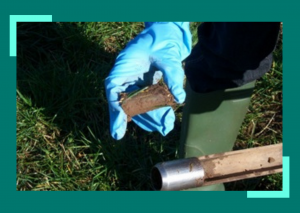
As part of AFBI’s Farm Nutrient Management work, four hundred fields in the Blackwater catchment were soil sampled in early 2019. Regular soil sampling (once every 4-5 years) is extremely important in order to increase the efficiency of nutrient management on farms and improve soil health. Along with optimising grass yields, more efficient nutrient management minimises the loss of surplus nutrients to the environment. The Blackwater soil sampling revealed that two thirds (66%) of fields contained above optimum levels of soil phosphorus, but there were also areas of nutrient deficiency. In particular, low soil potash levels were found in 40% of fields sampled, and two thirds of fields (64%) were in need of lime.
Seventeen farmers in the CatchmentCARE Project received tailored nutrient management advice for their farm, along with slurry and grass silage analysis. Slurry is a very valuable source of nutrients, with a 2000 gal / acre application able to provide much of the nutrient requirements for early spring growth. Great care must be taken however to distribute slurry on fields where it is needed most, and to only apply slurry when field conditions are suitable and keeping distance from nearby waterways, following best management practice guidelines (see infographic on Good Agricultural Practice (ROI) and the Nutrient Action Programme (NI) at www.catchmentcare.eu/publications).
For farms where soil phosphorus levels were high, farmers were advised not to apply additional chemical phosphorus fertilisers, particularly to fields receiving slurry applications. Grass silage analysis prior to first and second cut revealed that despite reducing or eliminating inorganic phosphorus fertiliser use, the grass obtained enough phosphorus from the soil for growth, and grass silage phosphorus levels were within the healthy range. While phosphorus tends to be in surplus, deficiencies of potash were evident in some of the silage fields; this is common across Ireland, as is the need for more frequent lime applications. Early spring applications of sulphur are also beneficial, with AFBI research having shown potential yield losses of 30% due to sulphur deficiency.
One year on, with some simple changes to their grassland management, farmers have been able to maintain grass production on their farms, making efficient use of plant available nutrients while at the same time reducing the risk of loss of nutrients to the environment – a win-win situation for everyone!



